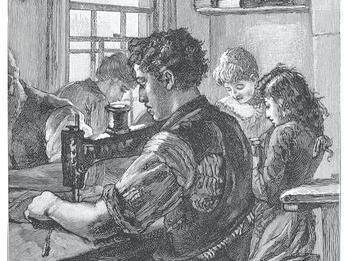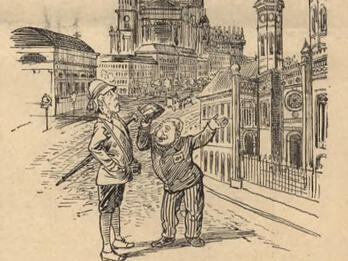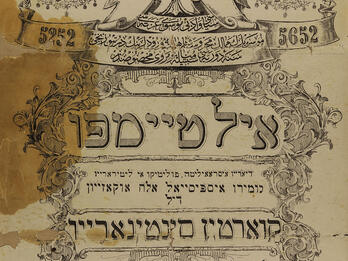Book of Cooking and Home Economics for Jewish Housewives
Preface
It is a not a simple cookbook that I am presenting herewith to my sisters in faith, although most room is given to the “kitchen.” This book of Cooking and Home Economics [Koch- und Wirtschaftsbuch] contains everything practical one needs to know regarding not only the entire extent of a regular household, but also for establishing and managing a religious household. This book is the fruit of many years of collecting, beginning in my 15th year, when I had to take over from my mother, and during a 20-year marriage as the housemother of many boarders and caretaker of my own large family.
Until I became a bride, I lived in France, and afterwards, due to my husband’s profession, in the south, north, and east of Germany. Wherever I lived, I studied the features of local cuisine and put them to use. The proficient housewife will find much that is new to her and will look for in vain in other books of this kind. The young wife, however, will find practical, tried-and-true advice for her work in kitchen and house, for accidents in the family, as well as for the physical education of her beloved little ones.
This work, too, will have its faults. But indulgent readers will consider the words of the poet: “Who brings a lot will bring something for everyone!”1 The richness and comprehensiveness of this work and the low price, I hope, will win this book of home economy numerous friends and soon afford me the pleasure of adding everything that is missing in a new edition, and so achieve in this field something drawing ever closer to perfection.
May my book inspire our Jewish housewives, despite all the demands of modern cooking and house management, to be always and primarily concerned with preserving our time-honored customs, sanctifying the Sabbath and holidays, and to conduct her business in the house in keeping with the laws of our religion.
Charlottenburg [Berlin] in May 1888.
Mrs. Flora Wolff [ . . . ]
Menu for Friday Evening
Most families in Prussia, Pomerania, Posen, and Silesia content themselves with a good fish dish and a simple fruit, beer, or wine soup. In northern Germany: Hannover, Hamburg, and so on, a delicious meat soup or roast meat is served, accompanied by a suitable vegetable, no fish. In southern Germany: Soup, fish, and roast meat. Below we present sample menus for simple and fine dining.
Fancy Menus
Northern Germany
| Noodle soup | Noodle soup |
| Green beans | Black salsify roots |
| Italian beef | Roast beef |
| Almond cream2 | Compote |
***
| Mockturtle soup | Wine soup |
| White beans (East Frisia) | Spinach |
| Stuffed breast of veal | Veal cutlets |
| Lemon flummery |
***
| Bouillon with meat dumplings | Mushroom soup |
| Red cabbage | Red cabbage |
| Stuffed breast of veal | Pot roast |
| Almond cream | Cherry flummery |
***
| Wine soup with tapioca | Gruenkern soup3 |
| Stuffed white cabbage | Young carrots |
| Browned beef | Beef tenderloin |
| Lemon gelée | Strawberry gelée |
***
| Soup of sweetbread [ris de veau] | Turkish wine soup |
| Cauliflower | Apples with rice |
| Braised beef | Veal cutlets |
| Champagne gelée | Compote |
***
| Chicken soup | Veal soup |
| String beans | Apples with potatoes |
| Chicken ragout | Boiled veal |
***
| Meat soup | Cucumbers4 |
| Sugar snap peas | |
| Saddle of veal5 |
***
| Chicken soup | French soup |
| Pears with dumplings | Pears with potatoes |
| Roast chicken | Chicken ragout |
| Rhubarb compote | Marinated cucumber salad |
***
| Beef soup with rice | Semolina soup |
| Chestnuts | Sweet and sour beans |
| Tongue of veal à la Tartare | Mutton roast |
| Cherries | Cucumbers |
***
| Celery soup | Soup of lung of veal6 |
| Rice with raisins | Red cabbage with chestnuts |
| Stuffed spleen | Steamed chicken |
| Pears | Cucumbers |
Southern German
| Noodle soup | Wine soup |
| Salmon | Trout |
| Steamed chicken | Fried chicken |
| Apricots | Rice pudding |
***
| Gruenkern soup | Chicken soup |
| Tench7 | Carp |
| Puff pastry with veal ragout8 | Stuffed duck |
| Apples with currants | Compote of oranges |
***
| Bouillon with meat dumplings | Veal soup |
| Northern pike | Polish carp |
| Chicken ragout | Chicken with rice |
| Cucumbers | Sweet pickled cucumbers |
Prussia, Pomerania, Silesia, Posen
| Beef soup | Bouillon |
| Goose giblets | Chicken ragout |
| Marinated salmon | Noodles9 |
| Pears | Stewed fruit |
***
| Lemon soup | Beer soup |
| Salmon | Marinated salmon |
| Roast potatoes | Roast potatoes |
| Sweet pudding10 | Vanilla pudding |
***
| Creamed herb soup11 | Cherry soup |
| Carp | Baked carp |
| Horseradish | Boiled potatoes |
***
| Apple soup | Wine soup |
| Northern pike | Tench |
| Horseradish | Omelets |
| Sweet pudding |
***
| Tomato soup | Raspberry soup |
| Fish ragout | Northern pike in butter |
| Sour potatoes | Potato salad |
***
| Foamy beer soup | Beer soup |
| Northern pike with dumplings | Fish nuggets |
| Potatoes with parsley | Mashed potatoes |
| Cucumbers |
Notes
[Wolff misquotes the Prelude in Goethe’s Faust: she has Jedem instead of Manchem, hence the translation “everyone.”—Trans.]
[Known in America as frangipane (a milkless cream).— Trans.]
[Prematurely harvested spelt.—Trans.]
[Unless otherwise indicated, all cucumbers in these menus were salt-cured pickles.—Trans.]
[Kalbsrücken designates the saddle/back, which is the most expensive piece of veal.—Trans.]
[The technical term here would be calf’s lights.—Trans.]
[A type of fish.—Trans.]
[Also called Königinnen Pastete (vol-au-vent)—Trans.]
[Nudelspeise is a sweet dairy pudding made of noodles, milk, butter, almonds, and raisins that is baked in a mold.— Trans.]
[Speise simply means something to eat; here it is a sweet pudding.—Trans.]
[A dairy soup made with chervil, parsley, and perhaps snap peas, thickened with a roux.—Trans.]
Credits
Flora Wolff, Kochbuch für Israelitsche Frauen [Book of Cooking and Home Economics for Jewish Housewives] (Berlin: Siegfried Gronbach, 1889), pp. viii–iv, 194–97.
Published in: The Posen Library of Jewish Culture and Civilization, vol. 7.





